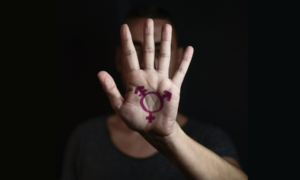The row of bereaved parents faced an audience of thousands in a Cincinnati ballroom a few days ago. Gathered by organizers of a conference on child welfare, they were linked by resolve and grief, and bound by the loss of their sons: Trayvon Martin of Florida, Steven Odom of Massachusetts and Rodriguez Greenlee of Tennessee, all African-American teenage victims of violence.
 The event, dubbed a “National and Healing Townhall,” offered an emotional capstone to a four-day conference organized by the advocacy and research organization Children’s Defense Fund for roughly 3,000 researchers, social workers, lawyers, educators and youth leaders to share the latest data and best practices on problems affecting young people in the United States.
The event, dubbed a “National and Healing Townhall,” offered an emotional capstone to a four-day conference organized by the advocacy and research organization Children’s Defense Fund for roughly 3,000 researchers, social workers, lawyers, educators and youth leaders to share the latest data and best practices on problems affecting young people in the United States.
On stage with Trayvon Martin’s parents, Benjamin Crump, their lawyer, brought up the ghost of another murdered boy whose name still throbs with hurts past and present: Emmett Till of Illinois, whose brutal murder in Mississippi at the age of 14 helped set off a wave of public outrage and created new momentum in the fight for civil rights. Wednesday would have been Till’s 71st birthday.
Just as Till’s mother had insisted on an open casket at his funeral, so the public could see what had been done to her son, the parents on stage offered up their children’s stories as a way to call upon the audience – including nearly 1,500 youth bussed in from around the country – to transform and heal the racial and economic divides they say led to their children’s deaths.
They appealed to young people in the audience to organize their communities, to use social media to draw public attention to unfair laws, and to resist destructive forces in their own neighborhoods.
“I am Clemmie Greenlee from Nashville, Tennessee, and I couldn’t save my child but I can fight like hell to save yours,” said the mother of Rodriguez Greenlee, an only child killed in 2003.
Pastor Ron Odom described the day in 2007 when he and his wife heard gunshots outside their Boston home and ran out to find their 13-year-old son Steven shot in the head, his basketball rolling away down the street.
“That was the day we were handed our drafting papers to this war,” Odom said. “We are turning the pain and the sorrow into action.” Ten days after Steven’s death, his killer was himself murdered, Odom said, continuing the senseless cycle of violence.
Young members of the audience were encouraged to ask questions of the parents. Youth upon youth lined up, identifying themselves by home states all around the country, and asking questions that were at once bleak, proud and hopeful.
One young man identified himself as “undocumented and queer.” Another, wearing a dapper suit with a bow tie, identified himself as a Stanford student who was a visiting scholar at Morehouse College.
One young man asked how he could motivate kids from his neighborhood to do well in school and stay out of trouble. “What good is potential without ambition?” he wanted to know.
Sybrina Fulton, whose son, Trayvon Martin, was unarmed and shot to death in a gated neighborhood in Florida this year, counseled the young man.
“You have to realize that you’re going to make mistakes. That’s part of growing up,” she told him. “But what you need to do, I think, is connect yourself with positive people. The people that are doing the right things that you are doing. They will uplift you and you will uplift them.”
As Fulton spoke, the chair beside her stood empty. Trayvon’s father, Tracy Martin, had become overwhelmed with emotion after speaking about his son and had left the stage.
 The tone for the event was set by legendary poet Maya Angelou, who settled her frail frame into a chair onstage and in a manner befitting a grand matriarch, delivered a commanding, rousing keynote address that enthralled the room with its mix of benediction, story-telling and poetry.
The tone for the event was set by legendary poet Maya Angelou, who settled her frail frame into a chair onstage and in a manner befitting a grand matriarch, delivered a commanding, rousing keynote address that enthralled the room with its mix of benediction, story-telling and poetry.
Angelou received a standing ovation when she first entered, and the audience stood for several minutes into her address. Hundreds of people held up cameras and phones to record her words.
“I came here to say something, and I’m not going to leave until I finish,” she said to loud cheers.
Resist allowing hate to poison your actions, she told the rapt crowd, especially if the upcoming trial for the man accused of killing Trayvon Martin ends in the man’s exoneration.
“I don’t want to see five more Trayvons and five Tryvettes get killed by police who have been waiting for that chance,” she said. “Let us please pray for courage. Courage is the most important of all the virtues.”
To strive for anything over and over again, she said, you must develop courage: “If you want to get at the point where you can lift a 100-pound weight, you start by lifting five pounds, and then 10 pounds, and then 20.”
Photos courtesy of Kaukab Jhumra Smith.



























